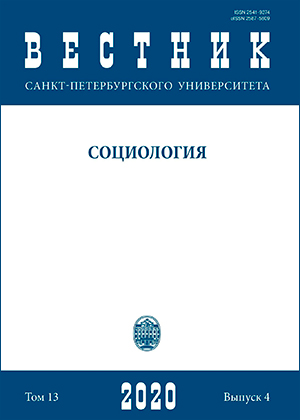The attitude of Russians towards corruption
DOI:
https://doi.org/10.21638/spbu12.2020.404Abstract
The article presents an analytical review of modern domestic and foreign research on the sociology of corruption and the psychology of a corrupt person. The necessity of an interdisciplinary study of attitudes towards corruption as well as mental and situational prerequisites for corrupt behavior is substantiated. The empirical results presented in the article are based on data from a large-scale survey conducted in 2018 by experts from the All-Russian “Znanie” Society in cooperation with the National Education Resources Foundation. As a result of the study, a detailed picture of Russians’ ideas about the essence and causes of corruption in Russia, typical behavioral reactions to corrupt situations, and the degree of the citizens’ interest in overcoming corruption was obtained. In the course of a survey of Russians, the dominant ideas about
the consequences of corrupt actions were revealed, and feedback was obtained on the effectiveness of methods to fight corruption. There are contradictions in the attitude of the Russians to corruption, which were revealed. The overwhelming majority of respondents avoids corrupt behavior and understand the costs of corruption for the country’s economy and social development. Almost half of the respondents consider corrupt practices an immoral act, but they will not hesitate to violate legal and cultural norms when it comes to the threat to life and specialized medical care for themselves and loved ones. With a high degree of condemnation of corrupt behavior and recognition of severe punishment of corrupt officials as the most effective measures, the Russians are practically not ready to support the institutions of control and punishment, to participate in the suppression of corruption. The results obtained can be useful for the continued search for reasons of why Russians have a relatively tolerant attitude towards corruption, as well
as the reasons for their involvement in corrupt behavior.
Keywords:
sociology and psychology of corruption, public opinion research, attitudes towards corrupt practices, bribery, consequences of corruption, attitudes towards methods of fighting corruption
Downloads
References
References
Downloads
Published
How to Cite
Issue
Section
License
Articles of "Vestnik of Saint Petersburg University. Sociology" are open access distributed under the terms of the License Agreement with Saint Petersburg State University, which permits to the authors unrestricted distribution and self-archiving free of charge.




